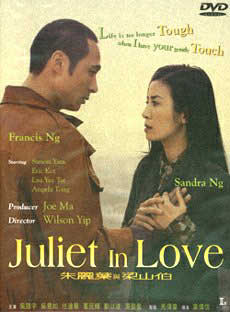Juliet in Love

Reviewed by YTSL
According to the magazine description of the airline
in whose plane I saw this movie (and yes, it was the first time I watched
a Hong Kong film while thousands of feet above ground), that which was on
view is a romantic comedy. In all honesty, I am at a loss to explain
how it can be perceived as such. Instead, IMHO, this low-key Wilson
Yip-helmed and Joe Ma-produced work is actually much more of a sensitive
-- and sometimes somber -- dramatic piece. After all, we are talking
about an offering whose: Main female character (Judy, not Juliet, is
well portrayed by character actress - not just comic -- Sandra Ng)
- is someone who the gods have latterly not treated too kindly; and dominant
personality is a man (Jordon - and no, this is NOT a typo on my part
-- is equally commendably essayed by Francis Ng) whose happy-go-lucky ways
cannot hide the fact that he is one of life's losers.

More specifically: Judy is a woman whose husband left her after she
suffered a medical calamity and whose beloved grandfather is rather senile
as well as frail; while Jordon is a ne'er do well who isn't mean enough to
be the kind of ruffian that people are apt to be scared by yet is hardly
the kind of man who can live a law-abiding kind of life. The paths
of JULIET IN LOVE's far from glamorous and happy protagonists cross when
Jordon tries to jump the long waiting queue for tables at the restaurant
where Judy is in charge of bookings and seating arrangements. Sometime
later, not only do they meet again -- while Judy is on her way to the hospital
to check up on her grandfather, who had had an accident; and Jordon on his
way to rescue a henchman (played by Tats Lau) from menacing debt collectors
- but they actually get saddled with a baby - whose parent neither of them
is -- to look after. Over the course of a fair amount of time, the
two different-temperament-but-both-lonely souls bond and also come to know
more about the other while looking after a human being who is more helpless
than either of them...

Though it could easily have been, JULIET IN LOVE is saved from being a major
downer of a movie by its somehow containing and sending out a lot of warm
vibes. This is due in some part to Matt Chow's generally nicely nuanced
script emphasizing that small rendered deeds - including such as the purchase
of a pair of cheap slippers or a dozen bottles of a well known soft drink
along with the loaning or claiming of a set of keys -- can have a considerable
impact on the lives of people. The definite abilities of the production's
actors - to not only keep their characters from becoming mere caricatures
but also, with a few broad strokes, infuse them with some humanity - surely
played a part too in this being so (The standout cast includes: Simon
Yam as a Triad boss named Cheng who is as concerned with being a good father
to his children as ensuring that he and his men get the respect he thinks
they are due; Lam Suet as the most brutish of Cheng's minions; Eric Kot as
Judy's shy suitor cum driving instructor; and the senior actor - whose name
I do not know -- who played the grandfather who inexplicably believed that
"No Coke, no hope"). The wonderful cinematography - which makes what
would otherwise be mundane surroundings and scenes appear special -- was
an additional element which contributed to my enjoying viewing this quality
offering (and recognizing that it had more care lavished on it than your
average year 2000 Hong Kong cinematic production).

This is not to say however that this is a faultless film. For one thing,
though quite a few of its details can be rather charming, this (re)viewer
is not particularly sure what is the ultimate point of this cinematic - and
emotional -- exercise. Most notably, it is my sense that the movie
had an unsatisfying ending which worked to unfortunately undo or undermine
much of what had been achieved earlier in the production. Something
else that bugs -- and I realize that here I risk sounding like Paul Fonoroff
or other PC moralizers but I still feel some obligation to complain about
- is that of JULIET IN LOVE's director and/or scriptwriter either being a
serious victim of Coca-colonialism or guilty of taking prominent product
placement to an even greater extreme than the folks who orchestrated the
Pringles insertion into the happy ending of Stephen Chow's "King of Comedy".
While commercial sponsorship is very much a part of - and can actually be
a source of in-joke amusement with regards to -- Hong Kong movies, this was
one case when it became too obvious, illogical and actually disquieting.

My rating for the film: 7.







